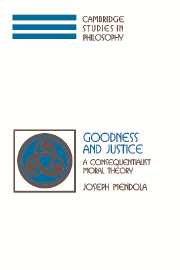6 - Just Construction
Published online by Cambridge University Press: 22 July 2009
Summary
The second element of the Hedonic Maximin Principle – its maximin structure – is the central subject of this part. Chapter 7 will argue that it is suitably intuitive. This chapter develops a direct argument for HMP on the basis of the ordinal hedonic value discerned in the last chapter. We will also consider the implications of other conceptions of hedonic value – for instance, a cardinal conception.
“Possible worlds” are fully detailed ways the universe might be. If there are other sorts of basic value than ordinal hedonic value found in other wildly possible worlds, still I will presume, for most of our discussion here, that such worlds are too unrealistic to be of concern to ethics. Call the worlds that are in question for us, which have merely ordinal hedonic value, “feasible worlds”.
The Hedonic Maximin Principle specifies the proper ordering, from worst to best, allowing for ties, of lotteries over feasible worlds.
That this is an ordering of things from worst to best means that (a) each member of the set of those things is either better, worse, or as good as any other specific member; (b) the “better than”, “worse than”, and “as good as” relations are transitive; and (c) nothing in the set holds more than one of the “worse than”, “better than”, or “as good as” relations to any other specific member.
- Type
- Chapter
- Information
- Goodness and JusticeA Consequentialist Moral Theory, pp. 187 - 225Publisher: Cambridge University PressPrint publication year: 2006



